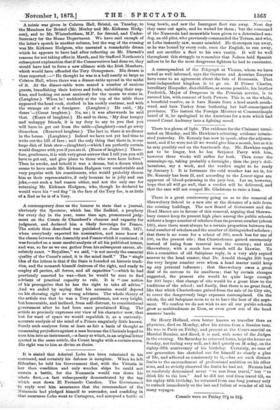A contemporary does us the honour to state that a
journal, obviously the Spectator, which has, like Zadkiel, a prophecy for every day in the year, some time ago, pronounced judg- ment on the Comte de Chambord's chances and capacity for judgment, and declared him a likely Sovereign for France. The article thus described was published on June 10th, 1871, when everybody expected his nomination, and none knew of the chasm between the Assembly and France which it contained-; it was founded on a most careful analysis of all his published letters, and was, so far as we can gather from his subsequent career, ab- solutely exact. "Royalism," we said, "is not merely the essential quality of the Count's mind, it is the mind itself." The "single idea of the letters is that if the State is founded on historic tradi- tion, and the monarch himself desirous of the right, and ready to employ all parties, all forces, and all capacities "—which he had previously asserted he was—then he would be sure to find advisers of practical capacity to rule. It is "one notion of his prerogative that he has the right to take all advice." And we ended by saying that his accession would depend on his choosing right or wrong advisers. The whole theory of the article was that he was a Tory gentleman, not very bright, but honourable, and inclined, from self-distrust, to constitutional government after he had been once proclaimed King. The article so precisely expresses our view of his character now, that but for want of space we would republish it, as a curiously- accurate analysis of the mind of a Prince singularly little known. Surely such analyses form at least as fair a basis of thought as unmeaning prejudices against a man because the Clericals hoped to turn him into an instrument, —a fancy at which, in an original letter quoted in the same article, the Count laughs with a certain scorn. His right was to him as divine as theirs.


































 Previous page
Previous page